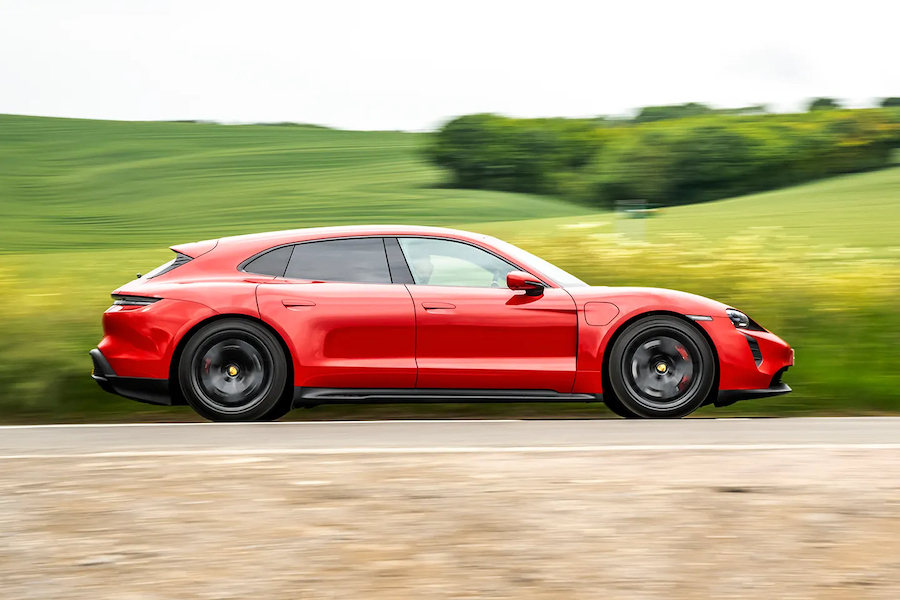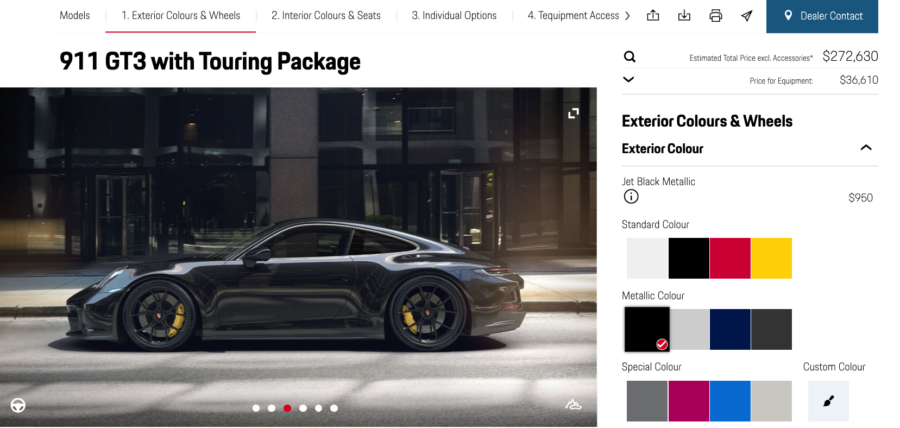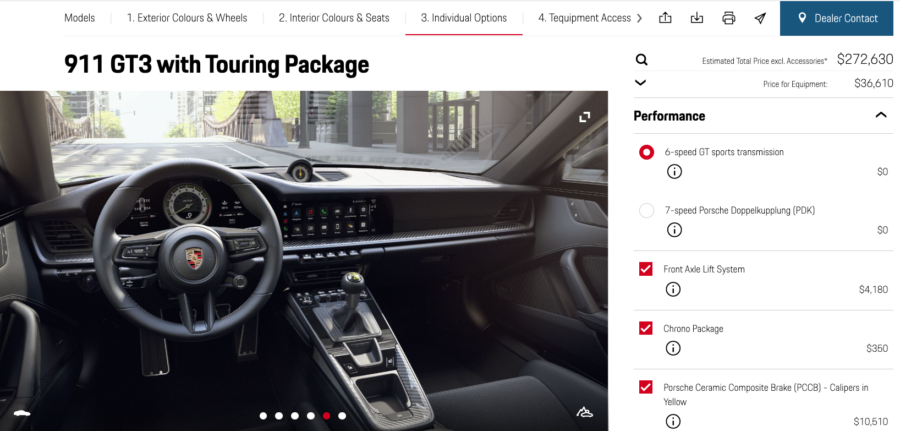
As I gaze across at my newly “specced” Taycan GTS Sport Turismo in Carmine Red on Truffle Brown leather with heated/cooled/massage seats, Burmester audio, and electrochromatic glass roof, I feel fairly contented… but not exactly like a kid on Christmas day. But why not? Why am I not “EEEK”ing with glee like your run-of-the-mill kid at Disney? Possibly because this new car is still so fundamentally similar to the Taycan 4S sedan it replaces, but also because I’m still trying to make heads or tails of this whole “speccing” business. And what a business it is!
For thosei of us who are automotively addicted, exceedingly nerdy, and relatively well-heeled, it’s taken for granted that “speccing” a new car is pretty special, particularly a Porsche.ii “But why,” the innocent observer asks, “is it such a big deal to tick a few boxes on an order form? Like, isn’t this just fetishising the vapid bureaucratisation of our contemporary “culture” with its endless stream of impersonal Captchas, COVID forms, and Customs declarations?” Well, yes, to a not insignificant degree that’s true, but there’s also a subtler and potentially more nefarious set of personal and interpersonal psychological effects at play here. Let’s dig in!
Now let’s set the stage for this anthropological investigation by framing the interpersonal psychology at work in “speccing” a new car, for which we’ll first turn to a quote from my recent review of the new 992 GT3:
Before you start getting all sniffy about the lack of infinitely available GT3s at your local dealer in-stock for sale at list price, allow me to remind you that human psychology exists and that the Daytona is legendary because Rolex makes it scarce, idem Birkins, Yeezys, etc etc. and that THIS IS WHY WE ASPIRE TO THEM. We’re human: we want to feel special, we want to feel “chosen” (without having to do the hard work of being bar mitzvah’d), and we want to feel like we have priviledged connections in a world where money doesn’t frankly mean all that much to our lottery-winning middle-upper crust. Besides, you think the Soviet economy isn’t still teaching us sociopolitical lessons from beyond the grave, providing our
overlordsedgelords with blueprints for managing our soi-dissant elite? Enhance, enhance…
All of which is to say that being granted the priviledge of “speccing” your brand new car – at least in this “supply chain constrained” and “modern luxury” world where manufacturers primarily aim for fat margins and orderbook backlogs, and anything resembling “innovation” or “excellence” plays second fiddleiii – is akin to being picked first for the 3rd grade soccer team at recess. How so? In that it represents a curated display of social standing and third-party recognition of “taste,” no matter how much it’s in our mouths. The 3rd grade soccer team isn’t just an idle example either, it’s one based on mankind’s history at war. Y’see when it comes to picking teams, no matter how seemingly innocuous or juvenile the context, we’re ultimately picking the brothers we’d go into battle with and lay our lives down for, if so required, so we all intuitively place a huge amount of weight and importance to these kinds of decisions. This isn’t to sound excessively somber or arrière-garde or anything like that, it’s just an observation that our innate desires for continuous social selection mechanisms run deep – very deep – really all the way down.
Because y’see our interpersonal lives are fundamentally predicated on wargames.iv So it is that petrolheads love nothing more than to compare contrast stitching colours and 0-60 times and ‘Ring speedsv in the exact same way and for the exact same reasons that thinktankers compare submarine magazine capacities and drone flight ranges: we’re all ultimately trying to figure out who “wins” before a shot is even fired. Because top trumps. Because the best defence is a good offence. Because sometimes you gotta escalate to de-escalate. And because all’s fair in love and war, which is to say that they’re really the same thing, and which really goes a long ways towards explaining the frequently curious human social behaviours necessitated by the eternal conflicts of passion, scarcity, and their overlapping fringes.

Then there’s there’s the personal psychology to figure in, and would you believe that Porsche makes a fine art of playing its customers like flutes in a manner that only Ferrari before it has? So it is that “speccing” is akin to telling Santa exactly what you want for Christmas and then 6-24 months later getting exactly that.vi Because y’see we’re all just kids inside, each of us trying in our own curious ways to recapture a fraction of the innocence, purity, and joy of our childhoods (or to rewrite those childhoods as much more joyful than they were in those less fortunate cases).
Then there’s the double-edged blade of our transgressive rejection of tradition and bear the burden of our neotenic obsession with novelty. Like, how important could old shit possibly be to me? I mean, the present appears to be changing so quickly.vii Change is going vertical, man.viii So let’s get that new new!!! With the singularity at our doorsteps, there’s really no need to scour the four corners of the globe for that elusive one-owner barn-find when we can just call up Santa and get the latest greatest rocketship with air conditioning and an extended warranty. So what if the new car doesn’t have as much “character” or “personality” as the old one, if we wanted headaches, we’d talk to our hoochie wives and spoiled children!
Plus, these new cars are the last of a dying breed! So they’re basically investments!! We ARE in a Fourth Turning after all, and the future couldn’t possibly be anything less than apocalyptic, irrespective of political stripe. “EVs are inEVitable and going to make new cars fat” etc. etc. quite in spite of the fact that EVs have a very narrow (if still perfectly valid) but still aren’t about to replace combustion engines in our lifetimes,ix and that new cars are already gaining 400-800 lbs from generation-to-generation (*cough*AMG GT*cough*M2*cough*) even before battery assist is required because that’s what fat-ass consumers want. But regardless of how inconvenient (or convenient) these truths might be, they all incite a very finely-tuned form of material consumption as a means of shielding our psyches from the oncoming DOOM TRAIN.x And how.
So that’s it! We delight in “speccing” because we cower in smallness – and even take pride in it – if perhaps necessarily so. Who are we to move mountains when the glaciers might not even be there tomorrow? Who are we to achieve great communal ambitions when there’s so much pain and destruction in the world? So this is how we ride out the war, while waging its simulation at the same time.xi As one stereotypical Rennlister notes, we clutch our pearls, past the point of no return even, because we’re special like that:
I would not buy someone else’s [911]R and sell the GT3 Touring I spec’d to my own liking.
But aren’t we though?

[Photo credit: Pistonheads (1), Porsche Configurator (2,3)]
- I say “those” as if it were somehow a gender ambiguous assertion, which it plainly isn’t. It’s dude city in this car hobby! “But Pete, there are like totally women petrolheads too!” Yes Timmy, I know, but the type of mental illness we’re describing here is seen in 100x more men than women, just like bedwetting and really just any other form of extreme behaviour you care to mention. That’s what it means to be “male” in a sexuate species, capiche? If females were always out on a behavioural limb, the little parasites in their bellies wouldn’t really have much of a chance of growing safely, y’know? C’mon this is obvious shit. Now back to car talk! ↩
- “But Pete, why Porsche in particular?” Well Timmy, because there really is no more sought-after nor multi-variate consumer experience in contemporary social life for mono-millionaires. It’s kind of as simple as that. Though I should clarify that Porsche is the brand only for this specific subset of the wealth pyramid. Those in the deca-million+ category, especially in denser metropolitan areas, also indulge in “speccing” everything from Ferraris to McLarens and even Paganis, Bugattis, Rimacs, Singers and so much more. But for us bumpkins in flyover country, Porsche is kinda the game in town. ↩
- It’s an LVMHesque world and we’re all just living in it. ↩
- For more on wargames and how hilariously facile but also overton-window-shifting they can be, be sure to check out the recent Sinica podcast interviewing Lyle Goldstein, director for China engagement at the think tank Defense Priorities. ↩
- J. Baruth has long since given up trying to dissuade keyboard-wielding car enthusiasts that lap times at the Nurburgring don’t matter and aren’t cross-comparable one to the next, but that same logic didn’t seem to work for
peopleresearchers comparing COVID “stats” either, and so it is that Jack’s Avoidable Contact #17 (archived) remains the seminal position on the matter (of Ring “times”). ↩ - Well, the local Porsche Dealer is exactly like Santa but with the only-too-explicit deal that should we ever decide to part with our newly acquired toys that He has right of first refusal on them, and only at sticker price, no matter how inflated the secondary market price may be above and beyond that, or else no more
“speccing”soup for you! What a game, what a game… ↩ - Just as long as we over-invest our attention in the whiz-bang world of bytes, just as we’ve been taught to do post-1973 – y’know as opposed to the “fuddy-duddy” world of atoms as was de rigueur pre-1973, at least in the Americas.↩
- To quote at length from Russ Roberts’ conversation with Walter Russell Mead, Ravenel B. Curry III Distinguished Fellow in Strategy and Statesmanship at the Hudson Institute and James Clark Chace Professor of Foreign Affairs and Humanities at Bard College on the recent Econtalk podcast:
[Henry] Adams was fascinated by change. And, in particular, he was fascinated because he felt he saw an acceleration of change: that changes were continuing in his time to move faster and faster and having greater and greater effect.
So, as he tried to get some kind of objective understanding of what was happening, he thought, ‘Well, what’s a way to measure progress or change?’ And he said, ‘Well, how about the muscle power which the human race is able to command?’ And, obviously, before the industrial revolution or before modern times, it’s basically muscle power, wind power. And so, the most convenient measurement, one that we don’t use as much anymore, was horsepower. How much pull could a horse do in an hour or whatever? And so, he developed an estimate of the amount of horsepower that human civilization could command.
And then, as he goes through the 19th century–and you had the steam engine, the Industrial Revolution, trains, ultimately the electric dynamo, and electricity–what you get is a hyperbolic curve, a curve that starts out with a very low slope of change. But, as the 19th century progresses, you are moving closer to infinity.
And, what Adams then does in the 19-teens is he says, ‘Well, suppose this continues. Let’s project it forward.’ And, if you do that into the 21st century, he gets where the slope of the curve is almost is approaching an absolute straight perpendicular line going up.
And that, interestingly enough, is one way of describing what people in Silicon Valley like to call the singularity. That is, where change is moving so fast that everything that happened in the past–and this is how Adams describes it–becomes essentially irrelevant. Human beings are in an entirely different world.
So, you can imagine different forms the singularity could take. You could, to look on the dark side: Nuclear war would be an example of the rate of change reaching infinity, at least for a moment. And then, human civilization–maybe the human species–disappears.
The development of AI. Now Adams, as he was, again–remember this is happening more than 100 years ago–Adams sort of said, ‘You’re going to go from the electric age,’–which was the age he saw himself in–to what he called the Electronic Age, as I recall. Where electricity is not just powering movement, but is becoming kind of the substance of what people do. Which is an interesting way of describing computers.
And then he talks about ultimately at this singularity point, you reach the Ethereal Age, from the word ‘ether.’ And, that’s not entirely inapt description of artificial intelligence.
So, in the essay I just found it fascinating. Here’s a guy, a historian who is best known for his works on the Jefferson and Madison Administrations looking forward and seeing a picture that’s not that dissimilar from what people would see today.
- If anything, the expansion of EVs and “green” industrial output will INCREASE OIL DEMAND in the years to come. Hm? Mhm!
People think electric cars will reduce oil demand, but they won’t.
If every car in the US were electric tomorrow, oil demand would likely increase.
Here’s why:🧵 pic.twitter.com/xt9vuJi6fF
— Brian Gitt (@BrianGitt) August 2, 2023
- Speaking of the oncoming DOOM TRAIN, I had a dream this week that the destination for my 10th wedding anniversary trip with The Girl wasn’t going to be Tokyo or Iceland as we’d been discussing, but instead to Taiwan (Taipei). Why? Because we gotta go while we still can! Dun dun dun… ↩
- Speaking of war, what car would you park in your driveway if the industrial economy had to retool tomorrow (archived) for cheaper, more plentiful, and less complex products, and supply chains for decadent cars with millions of lines of code were no longer viable? I mean, remember when the Chevy Volt proudly advertised that it had TEN MILLION LINES of code back in 2010, only to be
oneten–upped by the Bentley Continental GT advertising that it had ONE HUNDRED MILLION lines of code in 2017, both as if they were “good things” instead of absolute ticking time bombs waiting to go off? I’d personally be tempted to dust-off ol’ Saddam… ↩

[…] 4. More financialised colonialism: While EVs are currently more expensive to produce that ICE vehicles, like any other example of micro-electronics that’s given enough time and enough scale, eventually prices go down and margins go up, meaning that automobile manufacturers (and their shareholders) will soon be richer than ever. Of course, we Global Northerners will just be the ones designing, marketing, and reaping paper profits on these new gizmos while East Asian factories fueled by cheap peasant labour keep manufacturing our components and recycling our refuse, but hey “we just wanted” etc.! And as long as we keep the aircraft carriers and they keep the fishing dinghies, all’s fair in love and war. […]
[…] of seams, how great is the yellow stitching on this spec? Fucking […]
[…] game this last decade and I can certainly see adding more to the Contravex Garage in the future. Two almost isn’t enough! […]
[…] that on the Rich Pyramid™ the lowest level of aspiration is Capital,vi the intermediate level is Luxury,vii and the highest level is […]
[…] “true” Wunderkammer doesn’t have “investments” composed of high-priced mass-produced manufactured goods. It has maps, globes, specimens, […]